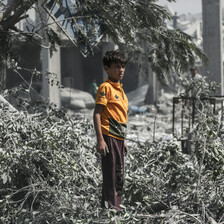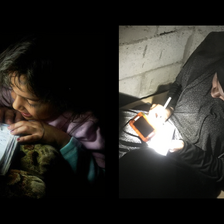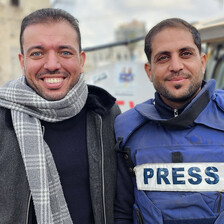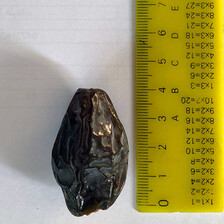The Electronic Intifada 23 July 2025
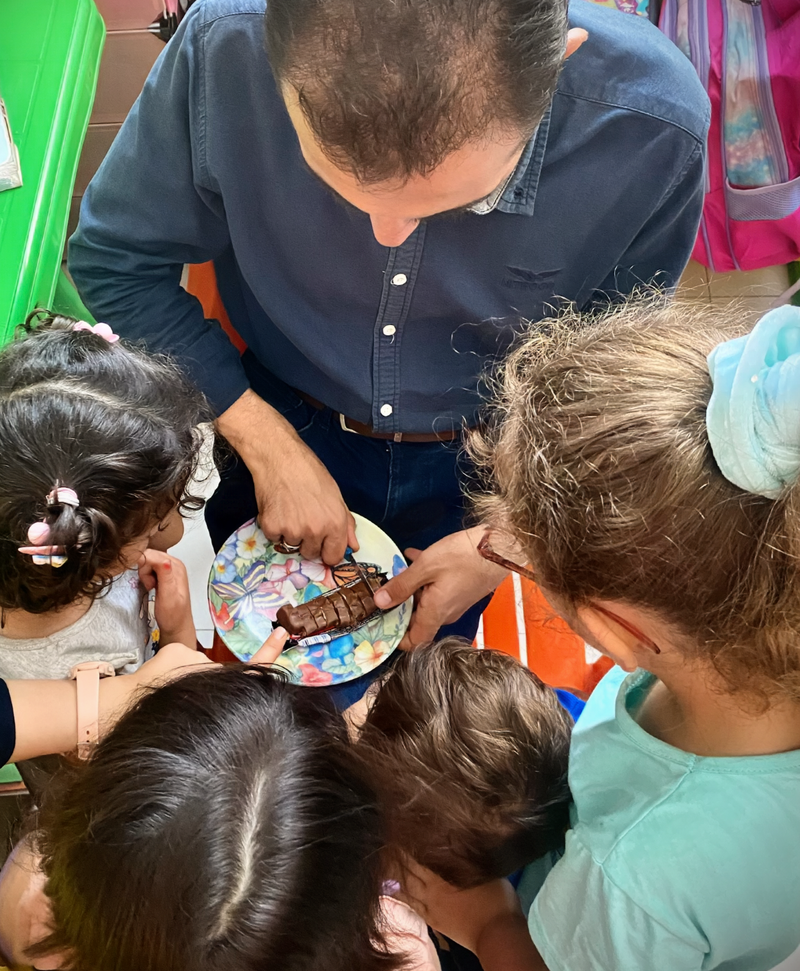
The author dividing a bar of chocolate for his nieces and nephews.
I’m not sure if I made a mistake promising my nieces and nephews something sweet in the middle of a famine.
I searched Gaza City for days before I finally found a single bar of chocolate, hidden like a treasure in the ruins of this old city. I paid an outrageous price and brought it back, breaking it into seven tiny pieces for the children, giving none to the adults.
As each child took a piece, I imagined its sweetness on my tongue, wishing there had been more for the kids.
A few minutes later, my beautiful 5-year-old niece Lana said quietly, “Uncle Asem, do you know my dream?”
I answered with curiosity, “Please tell me, Lana.”
“My dream is to have a whole bar of chocolate,” little Lana said.
For a moment, I couldn’t respond. How has chocolate become a dream for a child in the 21st century? Why is it impossible to grant even this small wish?
That moment stayed with me. And then I eventually realized: Israel is the reason we and our children cannot fulfill even the simplest dreams. Not poverty, not fate but occupation, siege and war. Israel!
Innocent hopes
That moment reminded me of another day during the genocide. I was standing on the street when I overheard children talking about their dreams – their small and innocent hopes if they survived.
Some wanted to see their martyred siblings again. Others dreamed of eating hot bread or chicken. One little girl said she wished for running water in her bathroom so she wouldn’t have to carry heavy buckets over long distances.
All of these were basic human rights, things no child should have to wish for.
But the voice that really hit me was from a little blond boy who whispered: “I just want to hear my mother’s voice calling me in the morning for school. That’s my dream.”
I knelt beside him and asked gently, “Is that really your biggest dream, buddy?”
He nodded and said, “It’s an impossible dream. My school was destroyed, and my mother was killed.”
I didn’t know what to say, until one of the children asked me, “Uncle, what’s your dream?”
I paused only for a second before replying, “My dream is for all your dreams to come true.”
Simple wishes
Later, I listened to some of my colleagues share their dreams. Quiet, tender and simple wishes: to eat a fresh meal with family again, to sleep in their own beds, to feel safe.
One colleague, an engineer, dreamed of helping to rebuild Gaza. Another said he hoped to visit the pyramids in Egypt one day. A third wished he could take his daughter to see the Eiffel Tower. And then, someone said softly, “My only dream is to tickle my kids again.”
Before we could respond, he added, “But that dream is impossible. I lost all my children in this war, two boys and one girl.”
I remembered Lana’s chocolate wish and the blond boy’s voice, and how our simplest dreams have become unattainable because of Israel.
My dream
That night I thought deeply about my own dream, a simple one regarding my daughter Furaat that Israel has taken from me for two years now.
My little 4-year-old Furaat, who was abroad with my wife Islam and son Eyad when the genocidal war began, used to call me Baba Asoomi. Her name, the Arabic for the Euphrates River, means fresh and pure water.
I spent nearly every hour of her first two years by her side. I still remember every detail: what she liked, when she liked it and how her smile could brighten my darkest day.
I used to give her a shower around 10 am, then she would fall asleep in my lap. Those were the most precious moments of my life, holding her close and breathing in the scent of her hair. I can still recall it exactly: fresh, sweet, uniquely hers.
I am sorry for each of the nearly 750 days we’ve spent apart.
My dream is simple: to smell her hair just once more. But I know that this dream also has been denied because of Israel.
These are our dreams in Gaza now: a bar of chocolate, a glass of clean water, the voice of a mother, the scent of a child’s hair, the warmth of laughter in a home that no longer exists.
These are not luxuries. They are what make us human. They are what Israel steals from us first.
But we will never give up. Our dreams will come true: little Lana will get her chocolate and I am going to breathe in my daughter’s sweet scent again. And of course, Palestine will be free.
Asem Alnabih is an engineer and PhD researcher currently based in Gaza City. He serves as the spokesperson for Gaza Municipality and has written for many platforms in both Arabic and English.
